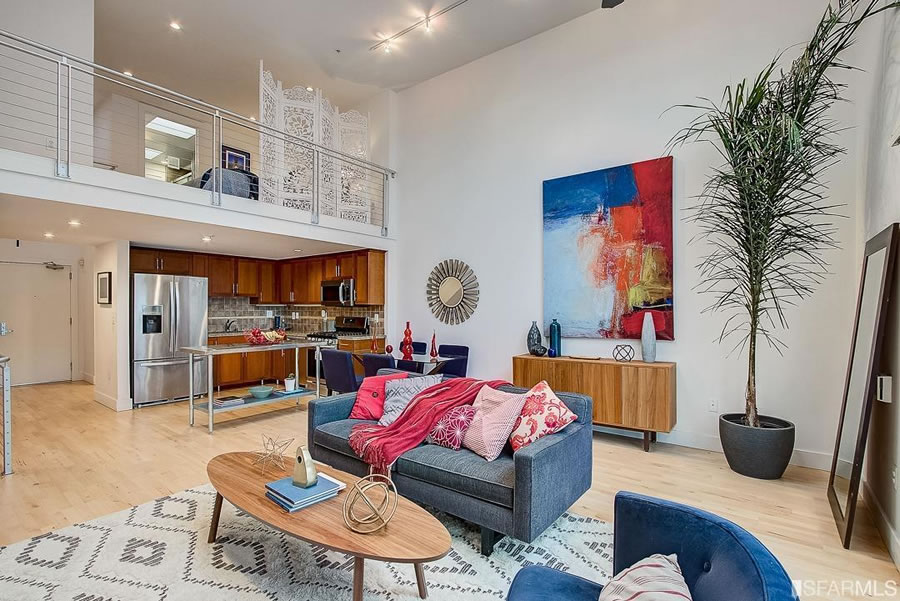Purchased for $1.185 million in December of 2015, the “modern, stylish, tri-level loft” #14 at 175 Russ Street, “located in the heart of SOMA,” with easy access to tech shuttles and company headquarters, as well as to Whole foods and “countless restaurants and cafes,” returned to the market priced at $1.195 million this past August, a sale at which would have represented nominal appreciation of less than 1 percent for the condo since the end of 2015.
In addition to its 1,361 square feet of living space, the two-bedroom unit includes a deeded parking space and storage.
And having been reduced to $1.095 million in September and then withdrawn from the MLS, 175 Russ Street #14 has just been listed anew with a “$995,000” price tag and an official “1” day on the market according to all industry stats and reports.
If you think you know the market in SoMa, now’s the time to tell. And yes, while inventory levels are actually up, not down, in San Francisco, pending sales volume is, in fact, down.
The resale of 175 Russ Street #14 has now closed escrow with a contract price of $1.165 million. That’s officially “17.1 percent over asking,” and with only “32 days on the market,” according to all industry stats and aggregate reports. On an apples-to-apples basis, however, that’s 1.7 percent under the value the unit fetched at the end of 2015 after 8 months of marketing.







After a few percent of commission, that’s a lousy loss.
Meanwhile, S&P 500 rose 43% in the same three year period.
Posted by Ohlone Californio, 1 month ago: “The Juul wealth creation happened, and they’re buying things that are written about on Socketsite. So there you go, word.”
1.7% under 2015! Post Juul. Post Lyft!
LYFT IPO has to be the biggest joke in SF for 2019. THE IPO EFFECT!!!!!
Word is that insiders are wanting out so bad that they are getting banks to structure “a product that appeared to offer Lyft’s pre-IPO shareholders a way to get around lockup agreements that prevent them from selling for at least six months after the IPO.”
Might be too much heat for the big boys, but plenty of small shops willing to cater to insiders wanting an early out.
And for all those claiming that it’s too early to tell anything because the Lyft lockup period is not over yet, from yesterday: Will Uber’s IPO really boost San Francisco house prices?
Emphasis added. Maybe this time things will be different and after the lockup period is over all the modern, stylish, tri-level lofts will start flying off the market with multiple double-digit percentage over asking bids.
Why did you bold the clause you did, and not the concluding sentence? Does the concluding clause not speak to the SF-located series of IPOs and liquidity events? Also, I note that you’re citing a summary of a study that has already been linked to. When it was done the last time, the editor found reason to weigh in and to editorialize. In your instance, you were allowed to editorialize without further interjection.
Because, even if you accept the validity of the study (which is questionable) for the sake of argument, it doesn’t support the assertion that home prices and/or sales will increase after the lockup period ends. I emphasized the sentence that relates the key finding that home price indexes in the area shouldn’t be expected to change post lockup period.
Anyhow, two separate class-action complaints were filed against Lyft Wednesday for exaggerating in its prospectus for the IPO.
i think the reason some folks think it is different this time is because we are expecting 7 tech IPOs, not just 1-2.
But why would more IPOs change the timing of the IPO effect?
What’s different about this group of IPOs is the long pre-IPO period, the active pre-IPO secondary markets with the chance for many employees to cash out pre-IPO. That all points to the IPO effect being earlier this time. Most likely it has already happened.
Because they’re all in SF, it’s thousands of workers, and it’s simply much more localized.
SF real estate was red hot a few years ago when these companies were building up. But that’s the past. What matters now is how they do as public companies. Not the liquidity event.
thinker, most employee do not take advantage of pre-ipo secondary markets.
This singular condo is grounds for some sort of bizarro fanboy callout it seems. Odd.
UPDATE: In the Heart of SoMa Take Two (And Three)